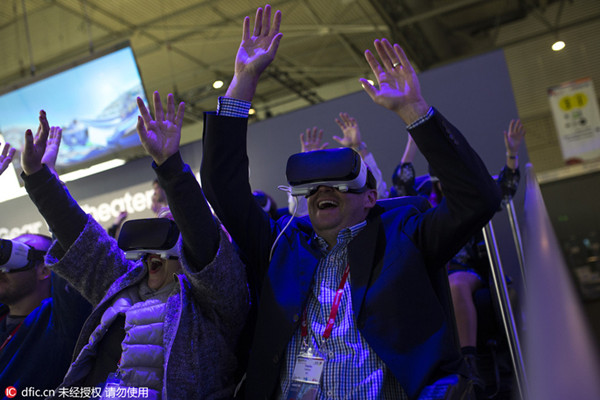 |
|
Virtual reality developments are opening up new possibilities for theme parks. [Photo/IC] |
Feel like going into Wonderland with Alice as if it were real? Or stepping off on some distant planet to fight for justice like in Star Wars? Well, it may be something more than just a dream fairly soon thanks to recent technological developments in virtual reality -- or VR.
How do we know? Well, when the China (International) Amusement Facilities and Equipment Expo got off to a bouncy start, on March 14, in Beijing, at the National Convention Centre, the virtual reality products were a major hit, with the VR concept being applied to culture and entertainment and showing what appears to be a promising future for theme parks.
In explaining the development, Yang Tao, manager of the Beijing Sweet Technology Co, a VR company that provides high-tech entertainment approaches, says, "We want to create a new recreational form through this technology, by replacing traditional projection technology with VR, so that theme parks will be able to provide much better, and safer, entertainment experiences at a smaller cost."
VR products are supposed to give people a deeper immersion in a given scenario and free their imagination and enrich their experience, than with traditional entertainment forms, while reducing the physical limits. The applications range from games to films to sightseeing and adventure tours to exhibitions, hence the new set of possibilities for theme parks.
Yang goes on to say, "VR will cause theme parks to evolve into a new era." Yang and his team from Sweet Technology are cooperating with a Chinese entertainment giant, the Huayi Brothers Media Group on a VR project for the Brothers Film Studio & Resorts, in Suzhou, Jiangsu province, which is expected to open in June 2017, as the first ever VR experience store of its kind in the world.
"Our technology is catching up very fast with the West and we're almost on the same page, but there's a real disadvantage in IP development, where we really need to pay more attention," Yang said.
The idea of virtual reality first appeared in a short story by Stanley G. Weinbaum in the 1930s where the novelist describes a goggle-based virtual reality system with a holographic recording of fictional experiences with smell and touch. The study of VR got started in the 1960s and some models began to emerge in the past two decades. And, this year is widely seen as the breakout period for the industry, as tech giants, such as Oculus, HTC and Sony put greater effort into it, resulting in better products with improved content, a more immersive experience and more reasonable prices.
According to the latest iResearch Consulting Group study, China's VR will bring in at least 5.6-billion yuan ($880 million) this year, and, by 2020, they expect 8.2 million VR products reaching around 25 million users.
The world’s first VR theme park is The Void, in the state of Utah, US, which will open this summer. The city of Shanghai’s Shanda Co plans to introduce it to China. But, compared with traditional theme parks that can cover hundreds of thousands of square meters, the 400-square-meter Void space makes it feel more like a mini-entertainment playing area instead of a real theme park. The good news is that there is further room for exploration and development that could be enormous both in space and profits.
|
|
|
|
|
|
|
|
